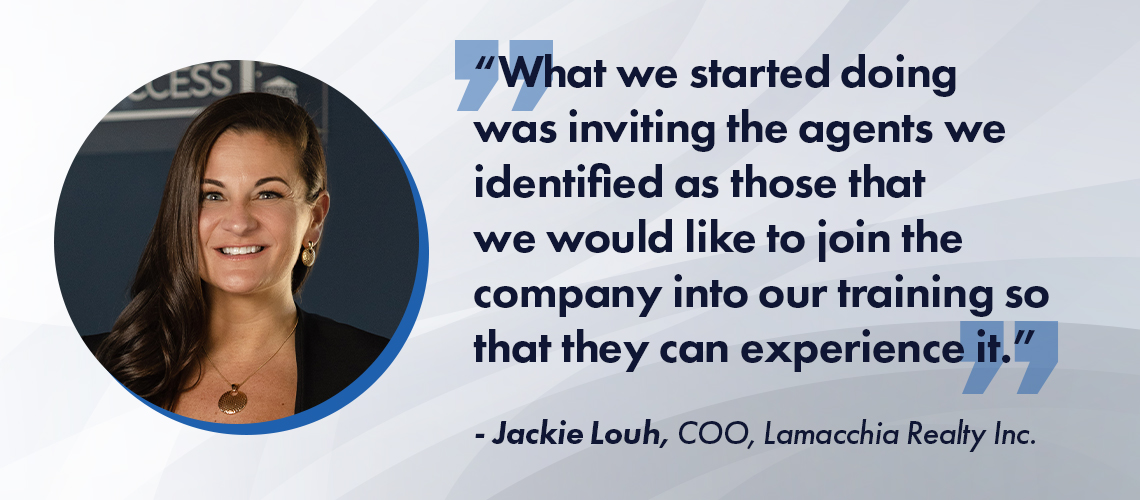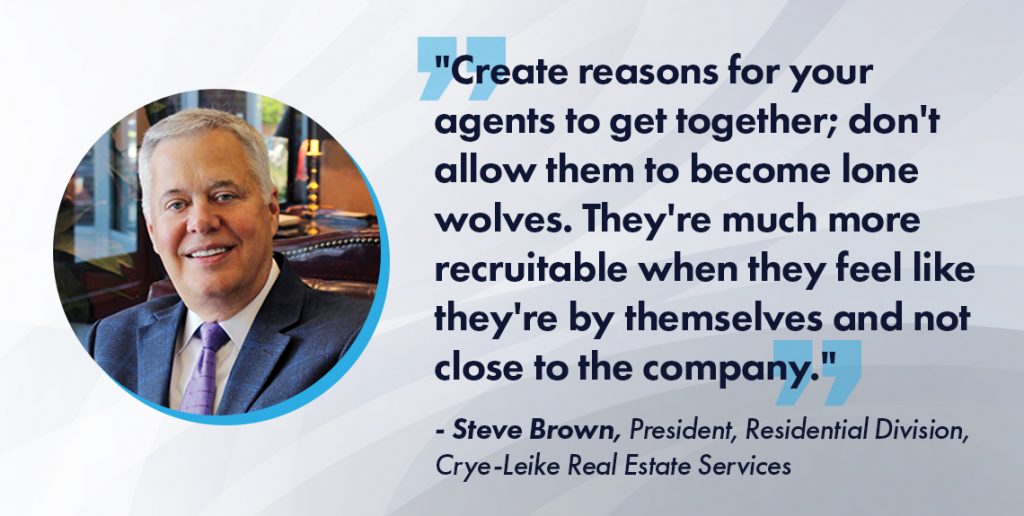
Above Left to Right: Steve Brown, Larry Flick V, Jackie Louh, Rei Mesa
When the real estate market gets tough, agents get antsy, often looking to jump ship in search of the “ideal” brokerage. There are various recruiting strategies brokerages use to attract agents, while simultaneously working to retain the ones on staff by providing them with the back-to-basic fundamental tools for success, from strong listing presentations to solid lead-generation strategies.
Unlike almost every other business, agents do not get paid unless they successfully close on a house bought or sold, so it’s not as if brokers can simply increase their bi-weekly paychecks to retain them.
Comprehending precisely what the market conditions are in their local area impacts how brokers should address the recruiting and retaining of agents—”or, as we like to refer to it in our company: selection and development,” explains Rei Mesa, president and CEO of Berkshire Hathaway HomeServices Florida Realty. This year is particularly hard to gauge because the previous few were not normal, with mortgage rates historically low and the pandemic helping to increase the number of houses sold so people could more comfortably shelter at home (remember that expression?).
“There’s no doubt that we’re in a changing market, and many agents are nervous about that,” says Jackie Louh, COO of Lamacchia Realty Inc. in Waltham, Massachusetts. “What they need is education and training. We’ve just gone through a two year-plus period where standard real estate practices have not applied, so agents need to be retrained. The conversations that agents are having with clients now versus a year ago are very different. It’s been some time since we’ve had to tell a client, ‘hey, you need to do a price adjustment on your home,’ so they must relearn how to have those conversations. And agents also need to relearn how to keep clients engaged.
“We’re seeing some buyers pullback,” says Louh. “They want to hold off a little bit before they purchase, so it’s now a matter of how often should I be checking in with this client? What should I be sending them? It’s really all about going back to the basics. Those are the things that brokerages need to be training. And if they’re doing that, those are the companies where the agents stay on, because they’re feeling confident in their skills and abilities.”
Larry Flick V, CEO of Berkshire Hathaway HomeServices Fox & Roach, REALTORS® in Philadelphia, Pennsylvania, endorses the back-to-basics recruiting approach as well.
“We’re talking about calls versus emails, the content of those calls, like ‘congratulations on your new listing,’” he says. “Maybe reaching out to a sales associate you’re recruiting to ask them about a house that’s been sitting on the market for a while and offering some help on what they can do to move it along. Offer advice on areas where they should be focusing their energy.
“We invite agents we’d like to join to our company events,” adds Flick. “We’ll also visit their open houses, and check in on them to see how they’re doing. Basically, we try to provide them with the support they need that they may not be getting from their current broker.”
In the same vein, Steve Brown, president of the Residential Division at Crye-Leike Real Estate Services in Germantown, Tennessee, advises not trying to sell too quickly why potential recruits should join.
“You need to find out where the pain point is for these people,” he says. “Instead of doing what I call a data dump, talking about tools or marketing or education or anything, find out where the agent is at that point in time in their career. We need to know more about them before we start talking about us.”
Promoting Company Culture
“Every company talks about how great their culture is, but can people actually define it?” asks Louh. “Agents want to be part of a strong culture. I remember in a meeting with a broker/owner outside of my company, he said you can’t just talk about your culture, you have to live it. That really resonated with me. A lot of people think that culture is just about having fun, but it’s so much more than that. Yes, you want to make sure you’re doing fun things with your agents: luncheons, office outings and sporting events. Those things help build camaraderie.
“But you need more than that,” she continues. “Agents won’t stay just because it’s a fun place to work. They want to be in a place where they can grow their business, so you must make sure you’re providing agents with the tools they need to be successful, like photographers, marketing assistants, a transaction coordinator, all of that in-house. Everything they need right at their fingertips. Giving agents the tools they need to be successful coupled with all of the fun things is what creates a strong culture.”

Like every successful business, brokerages only want to bring in new people who they think will move the needle forward in every way. Improve the profitability, make new client connections and work well with existing staff members.
“We think it’s very important to be selective with who we are recruiting,” emphasizes Flick. “We don’t like to send out mass emails. We want to focus on sales associates who we think will be a good match for our company. It’s hard to be everything to everybody. And once you try to do that, you ultimately fail in who you are as an organization, and with the sales associates you want to partner with. We’re systematically and strategically targeting team members versus team leaders. Again, we’re not sending mass emails. They’re impersonal and don’t really reflect who we are. We do our research ahead of time and then make phone calls.”
Louh is a big believer in the training of agents, explaining that at Lamacchia, there are weekly training sessions every Wednesday. They’ve been so productive that the company has turned them into a recruiting tool.
“What we started doing was inviting the agents we identified as those that we would like to join the company into our training so that they can experience it,” she says. “Because people don’t always believe what they hear, they believe what they experience. Once they’re sitting in that room, they’re hearing the topics that we’re training about, they’re feeling the energy, and they get a very good sense of what it’s like to be with the company. That has had a huge impact on our recruiting.
“To take it a step further, what we’ll do is go out into local markets, to a hotel or a restaurant, we’ll rent space and open up a training session to all the agents in that market,” she adds. “Again, it’s about educating agents and giving them a taste of what it’s like to work with our company. And we reach out to them, calling and giving them little accolades, or asking if there are any issues they’re struggling with. Doing the types of things they may not be getting at their current brokerages.”
The Importance of Technology
How important is a brokerage’s technology? There are various opinions about using it in attracting and keeping new or experienced sales professionals.
“Technology can increase your efficiency, but it’s relationships that matter,” says Brown. “Technology is a tool, not an end-all. Certainly if you’ve got better technology, you can be more efficient in your work when you’re trying to make agents more proficient at what they do. We’ve got over 20 people that work in our IT department, and we’ve got people overseas writing code for us, so we have it, and it’s very good, but we focus on the relationship side of things.”

Flick agrees with that philosophy, though also emphasizes that technology plays a crucial role in the real estate industry.
“We pride ourselves on having great technology, the best in the business, best in class for sure,” he states. “But the selling of real estate is about relationships. The ones we have with our sales associates and the ones they have with their buyers and sellers.
“That said, technology certainly helps you become more efficient and more productive,” says Flick. “When it comes to training on technology, we’ve learned that it’s really important to have a beginner class, an intermediate class and an expert class. So we’ve tailored our training and our education revolving around technology according to the audience.”
Increasing Successful Transactions
With the market having shifted considerably over the past year or so, and not in a positive way, brokerages are formulating novel ways to improve their numbers. It’s a new way forward instead of simply waiting for the cycle to move in a more robust direction.
“I’m sure many companies during COVID had an influx of agents who got licensed and joined,” says Louh. “It inflated the numbers a little bit, but we’ve decided that we need to be more selective, and we want agents who are committed to putting in the time and effort to be successful. So we came up with a list of things that agents need to agree to if they want to be affiliated with us, and that has certainly changed the caliber of agents we’re bringing in.”
“If you fail to plan, you might as well plan to fail,” notes Flick. “And so we’re focusing a lot on business planning for this year. The last few years have been a bit of a whirlwind, and we’re in a more difficult market where it is the professional sales associates who are really going to shine. We expect to see a flight to quality over the next few years as we’ve seen in the past when the market normalizes.”
Brown emphasizes that it is vital to make sure the agents within a brokerage’s team feel that they’re valued, especially in tougher times.
“Create reasons for your agents to get together; don’t allow them to become lone wolves,” he says. “They’re much more recruitable when they feel like they’re by themselves and not close to the company. Write handwritten notes, call them, ask questions, talk about their family, their business. Help them get from $2 million to $5 million, from $10 million to $20 million.
“If we can’t help them grow, then we’re not going to be able to keep them, so do everything you can to create reasons to bring them together for different types of events to ensure cohesion in your company,” adds Brown. “We’ve got some headwinds, so it’s more important during this time than ever.”



